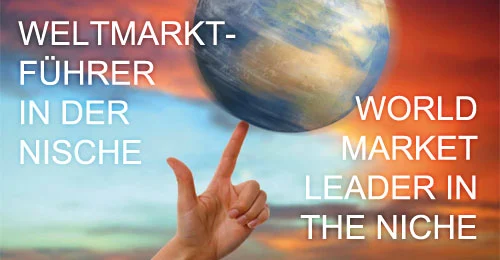World market leader in the niche: rules for startup companies
How do you become a world market leader? An answer to this question does not necessarily have to come from the executive floors of multinational conglomerates. Also many Adlershof companies have something to say on the matter. Three of these companies were founded in the early 1990s by employees at the Centre for Scientific Instruments of the former GDR Academy of Sciences. We have condensed the experiences of their managing directors into four rules for startup companies.
Advice number one: Concentrate on what you can do. “There’s certainly no sense in looking for a world market niche,” explained Thomas Schülein of Bruker Nano, formerly Röntec GmbH. “You must build up on your experience, and yet still be open to new ideas.” In 1996 his company, together with the Max Planck Institute for Extraterrestrial Physics and another partner, had developed a new X-ray detector that did not need the customary intricate liquid nitrogen cooling circuit. The major competitors shied away from the development risk and tried to rubbish the procedure. “The larger the company, the more conservative its decision making policy” explained Schülein. “And that helped us to our leading position in this field.” Today his detectors are still four times faster than the competitors.
Advice number two: Don’t be afraid of collaboration. “After all, as minor weights, we’ve got to stick together,” concluded Norbert Langhoff of the IfG Institute for Scientific Instruments, with twenty eight employees. Although the two companies operate in very similar fields, he has collaborated with Bruker Nano on the development of X-ray spectrometers that can measure the thickness of layers on solar cells – or, as mobile devices in a museum, can verify whether paintings are genuine. The X-rays needed for these applications are deflected precisely on the measured site through ultra thin, microstructured glass capillaries. “We are the market leader for these X-ray waveguides,” explained Langhoff. “So it makes sense to collaborate with other market leaders.” And when you patent your developments in good time, you won’t have to be afraid of knowhow transfer.
Rule number three: The customer is King. “We sometimes do away with our logo and instead incorporate Korean characters into our products,” admitted Frank Gerstmann of LLA Instruments. His company sells infrared spectrometers above all to manufacturers of recycling plant all over the world. Although they are interested in detecting reliably up to thirty different plastics at high speed, they sometimes do not want their end customer to know whom they have got to thank for it. “If we are to survive as a German company on the international level, a good personal relationship with the partner companies in each country must enjoy top priority,” explained Gerstmann.
“Advice number four perhaps also has something to do with the fact that I grew up in East Germany,” admitted Norbert Langhoff of IfG. “My advice is: Don’t grow too fast.” A conservative finance policy and only a slow growth in the number of personnel over the years helped his company to come through the crisis relatively unscathed. “If you suddenly have to dismiss employers, there’ll be unrest at the company,” explained Langhoff. “And then perhaps the really good people will go too.”
by Wolfgang Richter
